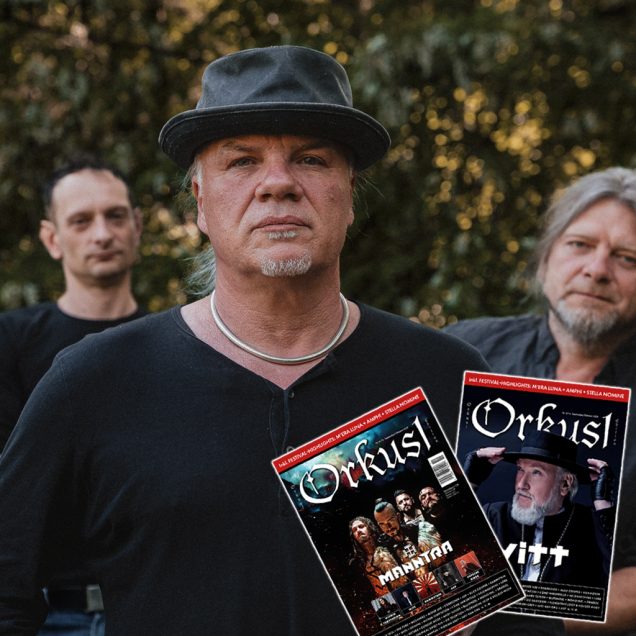20 years ago: Interview with CLAN OF XYMOX

(The following interview was first published in the Orkus! issue September 2003)
Nihilistic Melancholy – Part 3
20 years ago we did an extensive interview with Ronny Moorings of Clan of Xymox on the occasion of his then newly released album “Farewell”. In the third and final part, we now continue the conversation.
“… To follow your own ideals, not anyone else’s.”
Orkus: All the trends that the music industry wants to elevate to the new fashion bounce off Clan of Xymox. How have you managed to stay true to yourselves and your ideals over the years?
Ronny Moorings: Because I had to experience it the hard way when I was signed to a major in the past, although I was always concerned about my artistic freedom and keep that contractually negotiated. With the albums we’ve done for the major, we’ve never had a person breathing down our necks to sign off or agree to songs. We were also able to choose our director for the videos, the studio and the producer. But because you’re dealing with such a large number of people in such a large operation, you automatically get to hear a lot of different opinions about your music and a lot of subtle comments that still make you doubt it at some point. Sooner or later, you believe in their goals, not your own. And the goal of a major is, of course, to sell millions, whereas I’d be happy with a whole bunch less. Having had that experience, it’s pretty easy for me to see that the only way to make music is to follow your own ideals, not anyone else’s. For me, it’s very satisfying to go my own way and only have to answer to myself with each new record.
O: And what is this path that you are following? What goals are you striving toward?
RM: The word “goals” sounds a bit like a managerial term, and I make music precisely so that I don’t have to achieve such goals and numbers. I take things as they come. I also rarely plan a whole tour in one piece, because that smells more like work, working on an assembly line. For me, every concert has to be one hundred percent, and the only way to achieve that is to do things in moderation. My philosophy of life is not to chase some unattainable dreams, but instead to live my dreams every day.
O: How did you actually come up with this still today Clan of Xymox-typical mix of guitar music and electronic elements when you founded the band?
RM: It was very simple at that time: I had two synthesizers, a rhythm machine, guitars, a bass and a four-track. This meant that the combination was naturally given, so to speak. (grins)
O: In any case, this style has proven itself until today. As you have heard, you have been chosen as “Orkus! act of the month”. Do such titles have any meaning for you at all?
RM : We were already “Act of the Month” at Orkus! with the album “Creatures” and now again with “Farewell”, which is really a great honor for me and my work, because it shows that Orkus! likes the new album. And if you think about how many records are released every month, that’s a very nice compliment
O: Our last “Act of the Month” declared today’s youth as “Generation Destruction” because they would destroy nature without knowing why. What do you think about it?
RM: Well, if that were true, then they must have learned that from their parents, the flower power generation, which continues to have an impact all over this planet with very destructive policies. It’s their example that makes kids think they don’t have to worry about anything. But the beauty of the black scene is that they are very intelligent and sensitive people. Thus, there is still some hope. However, I believe that people in general have a destructive nature and that this has always been the case throughout history. There are only a few eras in which we hide it a little better than in the times when people give free rein to their destructiveness – a boiling point that comes to a boil over after years of frustration, with all the terrible consequences.
O: That brings me back to the thing about nihilism and lyrics like “in decay, beauty exists.” Are you actually a nihilistic contemporary?
RM: Yes, very much so. I’m really grumpy sometimes. That’s then the best time for me to escape into the studio so as not to annoy anyone with my mood – only later then on the album. (laughs)
“I think most people have a dark spot in their lives.”
O: Finally, I would like to talk about a discussion I had with another journalist regarding the black scene. It seems like many scene goers have a dark stain in their past, something that alienates them from “normal” society How do you see it?
RM: I think most people have a dark spot in their lives, some more than others, of course. But this is by no means to be limited to the Goth scene. In fact, the people who look the most normal are the most screwed up, just look at all the mass murderers. They were all so-called “normals”: weren’t they? The way you dress always goes hand in hand with your taste in music, it always has and probably always will. The only thing is that black clothes look more extreme than those of other styles. By the way, in the sixties, wearing jeans was very extreme. (grins) In my opinion, an extreme outfit is when you combine colors like orange and green with brown shoes. These people think they are the funny people – I actually can’t disagree with that, because they look like clowns to my eyes. (laughs) The way I see it, the black scene is one of the healthiest scenes around.
Peter Sailer
You missed the first part? You can read it here .
Here you can read the review of “Farewell”:
Listen to “Farewell” on Spotify:




